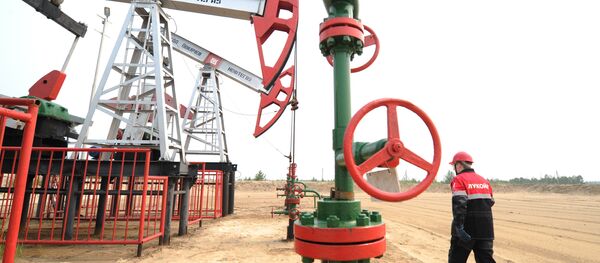The joint statement was signed in China’s Hangzhou on the sidelines of the G20 summit and followed a meeting between Russian President Putin and Saudi Deputy Crown Prince Mohammed bin Salman.
The two ministers announced that both countries have recognized an oil output freeze as the most effective tools available to provide stability to the oil market.
Alexander Novak called the agreement a “historic moment” in relations between members and non-members of the Organization of the Petroleum Exporting Countries (OPEC).
Meanwhile, a leading expert from the Union of Oil & Gas Producers of Russia, Rustam Tankaev, suggested that the statement could be the harbinger of a new alliance, which will finally replace OPEC.
“It means that Russia and Saudi Arabia jointly accout for a little less than 40 percent of the total foreign trade turnover. And if they agree between each other and then will be joined by Iran, Iraq, Qatar and Quwait, which also have low operational production costs, the new alliance will be quite capable of operating the world market,” he said.
And it does not really matter if the alliance would be officially formed, the expert said, adding that OPEC practically died over two years ago when it split into two groups which cannot reach any agreement with each other.
The oil-freeze statement is therefore quite capable of influencing the market and has a strong foundation, namely the low operational costs in Russia, Saudi Arabia and in a number of other states.
Meanwhile, Natalia Milchakova, Deputy Director of the analytical department at the Foreign Exchange Company Alpari Group, explained to Russia’s online newspaper Vzglyad what else this statement portained.
“Nevertheless the two countries were able to overcome these obstacles and agree on cooperation in correlating the supply and demand of the oil market,” she added.
Milchakova explained that the agreement was reached due to low oil prices, which, despite Saudi Arabia’s bravado and public declarations that it is able to withstand the slump down to $20 and even $10 per barrel, are still hurting the country.
Russia has recently successfully entered the Asian market, China in particular, which is a new market for it, the expert said. Traditionally, it was a territoty dominated by Saudi Arabia.
As the result, Russia is increasing its share of the Chinese market, while the Saudi’s share is going down.
It looks like the two rivals decided to call it a day, she suggested. As if to confirm the move, Saudi Arabia sharply increased its prices on October oil supplies to Asia and the US due to the growing demand.
Until now, she said, the Saudis’ key strategy was to lowball its price in order to keep its market share.
“According to economic theory, the two competitors seem to have agreed to cooperate on the basis of a so-called “zero sum game,” when each of the two players in trying to foresee the actions of his competitor, makes a compromise with his opponent,” Milchakova told the website.
“As the result, the two sides have traded-off their vested interests for the sake of a compromise. On the other hand, nobody has won solely due to infringing the interests of his opponent. Everyone has won without any mutual grudge,” she finally stated.






